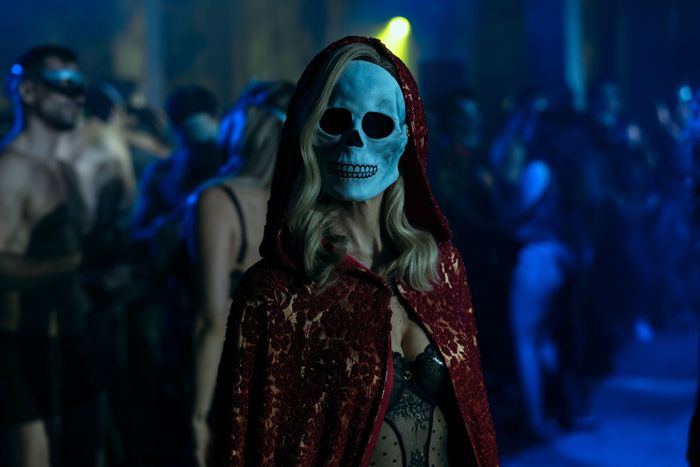
Throughout his various Netflix horror series, Mike Flanagan has maintained an interesting approach to adaptation that eschews faithful one-to-one representations of novels by authors like Shirley Jackson and Henry James, instead using them as thematic inspiration. That sometimes means sacrificing intensely cerebral terror in favor of jump scares and family melodrama — but in his best works, Flanagan offers a new take on the source material, a remix that becomes compelling in its own right. In fact, The Fall of the House of Usher might be his strongest mash-up yet, synthesizing countless works by Edgar Allan Poe into a funny, nasty present-day fable.
The series uses Poe’s titular short story as a present-day backdrop for the majority of the series. Over the course of these eight episodes, Roderick Usher (Bruce Greenwood) explains to Assistant U.S. Attorney Charles Auguste Dupin (Carl Lumbly) how each of his six children died in the last two weeks. Each of Roderick’s children, named after a Poe character, gets their own episode roughly corresponding to a famous story; that’s clear enough in the series’ episode titles. But within each of those episodes, there’s also a wealth of other references, from direct quotations to minor Easter eggs to nods to the writer’s personal life.
Episode One: “A Midnight Dreary”
“The Fall of the House of Usher”
So far, there’s not much here directly pulled from the original story, besides the focus on two twins named Roderick and Madeline Usher and the present-day setting of their rundown childhood home. But Dupin serves the role of the unnamed narrator from the story: He’s here to listen to the stories and musings of his old friend (and current nemesis) Roderick, who may or may not be insane. The flashback to Eliza Usher’s (Annabeth Gish) resurrection during the storm (following a burial to stave off medical intervention) also feels very reminiscent of the climax of the original story, though in that case it was Madeline.
“The Cask of Amontillado”
The opening use of Pink Floyd’s “Another Brick in the Wall” is a cheeky reference to the method Montresor uses to trap and kill Fortunato — who, as it happens, inspired the name for the Ushers’ corrupt pharmaceutical company in this series.
“For Annie” / “Spirits of the Dead” / “The Premature Burial” / “The Imp of the Perverse”
The episode begins in earnest with a funeral for the final three of Roderick’s six children. The preacher reads out passages from four different Poe works — two poems and two short stories.
“Metzengerstein”
Roderick’s eldest son is named Frederick (Henry Thomas), like the cruel young baron at the center of Poe’s first-ever short story to see print. We see during a conversation between his sister Tamerlane (Samantha Sloyan) and her husband Bill-T (Matt Biedel) — more on them later — that Frederick’s siblings resent him for the privilege that comes with his “eldest son” status. That’s true to the spirit of the story, in which Frederick abuses his power after inheriting his father’s vast wealth as an ungrateful teenager.
“Ligeia”
It makes sense the show’s fictional painkiller Ligodone would derive from this short story about an opium addict.
“The Raven”
The episode name comes from the first line of this poem, one of the most famous of all time. The name Verna (Carla Gugino) is an anagram of “raven,” and that fact combined with the adornment at her bar suggests she’s a personification of that iconic bird. We see the raven again after the funeral in 2023 when Roderick collapses and murmurs, “It’s time.” And Lenore, his beloved granddaughter, is named after the narrator’s lost love in the poem.
Poe’s Personal Life
Roderick and Madeline’s mother is named Eliza after Poe’s mother, who died young of tuberculosis and influenced much of his work. William Longfellow (Robert Longstreet), the former Fortunato CEO and biological father of Roderick and Madeline, is named after the poet whom Poe once accused of plagiarism. And, last of all, Judge John Neal (Nicholas Lea) is named after the prominent critic who was instrumental in drawing attention to Poe.
Episode Two: “The Masque of the Red Death”
“The Masque of the Red Death”
This one feels like a pretty fitting, creative modern-day update to the original story. Originally, Prospero was a prince who threw a masquerade ball to entertain the 1,000 other nobles quarantined in an abbey to hide from a deadly plague. In the end, they died anyway, killed by contact with the Red Death — which snuck in wearing a skull mask and red robe. Swapping the prince out for a “Gucci Caligula” playboy type feels right, as does the setting of a condemned Fortunato testing facility. In the show, the irony is underlined: The family’s old unaddressed toxic waste comes back to kill one of their own via acid rain. It feels appropriate for Poe, even in a contemporary context — and the presence of Verna wearing the Red Death’s mask and robe provides another nice reference.
“Annabel Lee”
In a flashback, a young Roderick (Zach Gilford) recites Poe’s final complete poem, which Roderick wrote for his wife of the same name in-universe.
“Metzengerstein”
The chemist who developed Ligodone is named Metzer, a shortening of “Metzengerstein.”
Poe’s Personal Life
Many think Poe’s actual poem (one of many about beautiful dead women) was inspired by Virginia Eliza Clemm Poe, his wife, who died of tuberculosis just like his mother. (They got married when he was 27 and she was 13, which echoes in Roderick’s weird relationship with the much-younger Juno.) We also see Roderick pitch to Rufus Griswold (Michael Trucco), named after the rival who painted Poe as an addict after his death — an amusing irony, considering Fortunato’s role in the opioid epidemic.
Episode Three: “Murder in the Rue Morgue”
“The Murders in the Rue Morgue”
Okay, now we’re really diverging from the text. The original story is often considered the first detective fiction ever published, introducing Dupin and his marvelous gifts for “ratiocination,” a method that later inspired fictional detectives like Hercule Poirot and Sherlock Holmes. But this isn’t a huge episode for Dupin, who doesn’t do much detective work in this show anyway. Instead, we focus on Camille L’Espanaye (Kate Siegel), one of the two victims from the original story, in which she and her mother are famously killed by a runaway orangutan. Here, she dies when digging for dirt at the facility where her sister Victorine (T’Nia Miller) experiments on chimpanzees: Roderick Usher Experimental, nicknamed (you guessed it) “RUE Morgue.” A tested chimp brutally mauls her, which certainly replicates the horrifying crime scene left by the ape of the original story.
“The Masque of the Red Death”
Camille’s positive PR involves painting Prospero as “America’s fallen prince.”
Episode Four: “The Black Cat”
“The Black Cat”
Back to another (relatively) faithful interpretation: Napoleon “Leo” Usher’s (Rahul Kohli) black cat Pluto has the same name as the cat from the story, whose eye the unnamed narrator gouges out while he’s drunk. He later kills the cat, then replaces it with a similar-looking cat — only for the new cat to get trapped in the walls with the wife he killed, leading the police to discover the truth. There’s no wife murder in the show’s take on the material (but many more dead animals), and the events get moved around; the disgusting eyeball-gouging comes later, with the replacement Pluto. As with other stories, this one is tweaked to end in a death rather than an arrest, but it’s basically the same twisted horror story about the dangers of alcoholism, with an axe swapped out for Thor’s hammer.
“The Spectacles”
The name Napoleon comes from one of Poe’s comedy stories, but it seems like the parallels stop there.
“The Journal of Julius Rodman”
Same deal with Leo’s boyfriend Julius, whose name likely comes from Poe’s unfinished serial novel.
Episode Five: “The Tell-Tale Heart”
“The Tell-Tale Heart”
It turns out Victorine’s lab was a handy setting for adaptation purposes; not only does it allow for a “logical” in-universe appearance of a murderous ape, but it ties into one of Poe’s other best-known stories. In “The Tell-Tale Heart,” an unnamed narrator’s guilt over killing an innocent old man begins to manifest as an increasingly loud heartbeat. Here, a scientist working on a revolutionary new heart valve kills her girlfriend with a bookend after she threatens to expose Victorine’s falsified records and other crimes. In the wake of the murder, she starts hearing a distinct chirping sound — which reveals itself to be the clamp around poor Alessandra’s heart, still artificially pumping. It’s quite possibly the show’s eeriest, most distinct angle on a Poe story. And stabbing herself to replace the heart for her study is a delightfully deranged piece of nightmare logic that ends the episode on a memorable note.
“The Premature Burial”
Victorine’s actual name comes from this short story about the fear of being buried alive.
“The Raven”
The narrator in the poem calls the bird a “thing of evil,” which is echoed in Roderick’s mention of Eliza’s belief that ravens were the minions of Satan because they survived the flood (a story Verna has also, of course, heard). But there’s an interesting contrast between Verna’s wordy, charming deceptions (kissing Madeline after she requests immortality) and the original raven’s refusal to elaborate (denying the narrator a reunion with Lenore in heaven).
Episode Six: “Goldbug”
“The Gold-Bug”
Here’s another one that only really shares a name with the original story, one about an eccentric man whose discovery of a scarablike golden bug leads him on a treasure hunt. The story largely revolves around cryptography and helped popularize cryptograms. But there’s none of that in the show’s take, which just borrows the name “Goldbug” for Tamerlane’s wellness company.
“Tamerlane”
Tamerlane’s name comes from Poe’s poem about a Turco-Mongol conqueror who chose power over love, and it seems like Tammy does just that by pushing Bill-T away.
“William Wilson”
Speaking of which, Tamerlane’s husband also happens to be the protagonist of Poe’s doppelganger story. Bill-T himself doesn’t have a doppelganger in the series, but Tammy does: Verna (a.k.a. Candy), the sex worker she thinks is trying to steal her husband and take over her life.
“A Dream Within a Dream” / “Eleonora”
Roderick quotes from this poem and this story while talking to Lenore about daydreaming of his dead children.
“The Pit and the Pendulum”
Morella (Crystal Balint) and Lenore (Kyliegh Curran) watch Roger Corman’s 1961 adaptation of this story, only an episode before they live through the show’s own adaptation! (Corman directed an adaptation of “The Fall of the House of Usher” only a year before.)
The Narrative of Arthur Gordon Pym of Nantucket
We haven’t yet mentioned Arthur Gordon Pym (Mark Hamill), but he’s the protagonist of Poe’s only complete novel. This episode nods to it with Roderick’s story about Pym’s time on the Transglobe Expedition, a real-life take on the adventure from the book — which does feature cannibalism, a character named Richard Parker, and the Hollow Earth concept. “Ultima Thule,” the name of the island Pym supposedly found in the series, ties back to the iconic Poe daguerreotype of the same name, borrowed from a phrase in his poem “Dream-Land.” Even the name of Pym’s whaling ship, the Grampus, gets name-checked here: It’s Lenore’s nickname for her grandfather.
Poe’s Personal Life
Verna’s alter-ego in this episode, “Pamela Clemm,” derives from Poe’s wife Virginia’s maiden name. And her address, listed as 1849 Reynolds Street, combines the year Poe died with the name he repeatedly yelled the night before his death.
Episode Seven: “The Pit and the Pendulum”
“The Pit and the Pendulum”
The narrator spends the original story locked in a dark cell during the Spanish Inquisition, waiting for a razor-edged pendulum above him to slowly reach and kill him. He manages to escape, but our Frederick doesn’t make it out so easy — and while he’s not imprisoned in the old building where he dies, the paralytic effects of the nightshade serve the same purpose. The swinging tail of the cat clock in the opening flashback also foreshadows this fate.
“The City in the Sea”
Verna recites this poem by Poe about a city ruled by Death.
“Morella”
Morella is named after the narrator’s wife (as well as their daughter) in Poe’s short story of the same name. Many trace the origin of the name to “great morel,” the name of a deadly nightshade, which gets incorporated into the show: Frederick uses it to paralyze her, but it dooms him in the end.
“Berenice”
Readers were horrified by the violence of this short story when it was first published. In a trance, the narrator rips out the beautiful teeth of the woman he’s due to marry while leaving her alive — the same disturbing fate Morrie faces in the show.
Episode Eight: “The Raven”
“The Raven”
The poem is explicitly quoted during the extended sequence when Verna kills Lenore — ending the Usher bloodline — and the raven visits to watch as Roderick grieves her. The finale ends with her, too, perched on the headstone as Verna recites “Spirits of the Dead” again in voiceover. Oh, and the famously repeating word from “The Raven” finally shows up in the form of AI-generated texts from Lenore reading variations of “nevermore.” (I’ve been waiting so long for “nevermore.”)
“The Cask of Amontillado”
In the original story, the killer traps his victim in the catacombs after luring him with the promise of amontillado wine — and walls up the space so nobody will ever know he’s there. Roderick and Madeline do the same with Rufus, though Madeline drugs an actual amontillado wine and seduces him to get him to the soundproof basement. The “Fortunato” name origin makes even more sense now.
“The Fall of the House of Usher”
This finale actually features the most material from “The Fall of the House of Usher,” with Madeline escaping her tomb to take revenge on Roderick during an intense storm that finally topples the decrepit house. Dupin manages to make it out fine, like the unnamed narrator, and recites the final few lines of the titular story.




